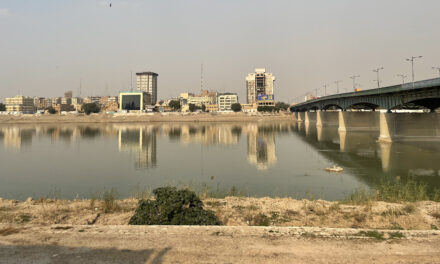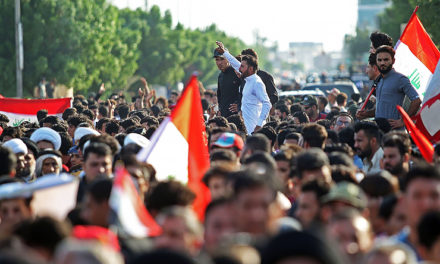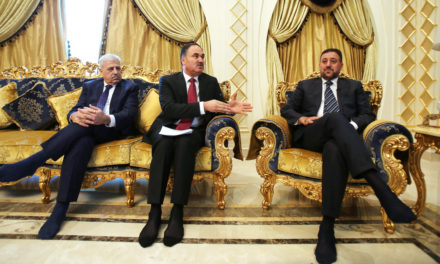Rasha Al-Bani is a 24-year-old British woman of Iraqi heritage from London. Beginning in late 2017, she began working in Baghdad at The Station; a shared space for Iraqi creative developers and aspiring entrepreneurs. Recently, Rasha was kind enough to share some of her experiences and talk about the programs on offer at this unique Iraqi civil society organization.

Share a little about yourself. What is your education background, and how did you become interested in Iraq?
I’m a British-Arab, born to Moroccan and Iraqi parents. I completed an MA in Conflict Resolution from Kings College London, focusing on Iraqi political affairs throughout. My primary aim at the time of my studies was to utilize my dissertation as the initial foundation for my PhD topic.
As someone who was living and studying in London, what motivated you to come to Iraq?
I had planned to move to Iraq as early as 2013 when I first started my Bachelors. My plan was to eventually pursue my PhD. One of the best pieces of advice I received during the course of my studies was that to truly be able to write about a place, you ought to live there for a while. Given that I have family in Iraq, speak the language, and have some familiarity with the culture, it wasn’t a hard choice to make. Once I completed my studies, I moved there in the fall of 2017.
Where did the idea for The Station come from? How was it established and what are its goals?
The idea for the project came from Mujahed Waisi and Muhannad Munjed. After studying the experiences of other civil society groups around, they wanted to adapt the model to the reality and specific needs of young people and entrepreneurs in Iraq. The Station was formed through an agreement with the President of the Association of Iraqi Private Banks, Mr. Wadee Al-Handhal, who helped support the project and establish it as a non-profit organization.
The Station aims to change the attitudes of young people in Iraq as the country transitions from a public-sector dominated economy to one oriented towards the private sector. It encourages the youth to pursue their own creative projects, strengthen their potential, and teach them the tools and skills necessary to be competitive in the changing job market. The Station also serves as a shared space for young entrepreneurs where they can network with their peers, business leaders, and investors.
What sorts of activities are there at The Station? Are there needs it hopes to meet that aren’t met elsewhere in Baghdad?
There are a variety of activities that go on at the Station. Currently, there are six active programs:
- The Makerspace intends to start a maker movement in Iraq by bringing together tech savvy individuals, with an interest in science, computer programming, creative art, inventions etc.
- The Train focuses on the individual’s understanding of businesses and trains them on pretty much everything one needs to know about how to start and a run a business of their own.
- The Cultural Metro emphasizes Iraqi heritage and its role in development. It also helps teach the ways in which profit and revenue can be attained through cultural businesses and projects.
- The Creativity Tram offers workshops and activities surrounding creative art and design in all forms, including digital art, and teaches the most essential elements in the context of business development.
- The Women’s Initiative for Empowerment Program is designed for women from various backgrounds and ages. It was established to help women take initiative and control over their own lives by developing their skills, learning the art of self-assessment, and putting theory into practice.
- The Stage is a social media platform that will be utilized for the exchange and sharing of ideas, knowledge and expertise between the Iraqi youth. The purpose is to provide an educational platform that is both educational and fun, as well as inclusive at the same time.
Ultimately, The Station is aiming to provide a space that provides the youth with resources that they would not find anywhere else in the country.
Could you talk about your time with The Station? How did you become associated with the project, and what has your work entailed?
I was first introduced to them by a mutual friend. He knew I was looking for a job, and they were in need of someone to join the team at the time. We initially agreed that we would have a trial run and see how we all got on together. Fast forward four months later, and working alongside them has been a wonderful experience.
I was ecstatic at the prospect of working with a local NGO instead of an international organization. It has meant that I am able to interact with the community at the ground level, and it has afforded me the opportunity to better understand the issues facing Iraqi youth in general. My work involves attending meetings, writing grants and proposals, going to conferences, networking, and assisting the management team with general organizational matters. We are now starting a new Research and Development Center that I am involved with as well.
What are your impressions of Iraqi civil society in Baghdad, especially amongst the youth? Are they optimistic for the future?
I would say they are cautiously optimistic. They are very aware of the challenges facing them, especially in regard to the lack of jobs available. Not only is employment hard to find, but the quality of education throughout the country is still quite poor. Young men and women come across positions that require candidates to hold certain skills. However, it is sadly often the case that young graduates are not properly prepared for the limited jobs that are available. It is certainly not a fault of their own; they are only able to take advantage of the resources at their disposal. The education system has failed them. Iraq is in need of intensive programs for graduates and non-graduates alike to help fill this missing skills gap.
What are your own goals for the future?
Working in Baghdad has convinced me to put my PhD on hold – at least for now. I plan to continue working here for at least a few years. Opportunities are endless here if one is willing to seek them out and make the effort to network. There is so much work to be done, and contrary to what many people believe, there are people on the ground here who are taking initiative and working on fantastic projects. And encouragingly, there is a growing community of Iraqi expats who have decided to move to Baghdad to take up projects as well.
Is there anything you would like to tell foreigners about Iraq or its people that they might not otherwise know from reading the news?
It’s hard to think of something specifically to tell foreigners about Iraq because there is just so much going on. But one thing that struck me when I first came to Baghdad was this: Iraqis are valiant people, in every sense of the word. The hope and courage amongst the population has given Baghdad a life of its own – and it is so addictive to be around.

Bradley Brincka
Bradley Brincka is a former US Army officer and worked as a volunteer ambulance driver for the Free Burma Rangers in Mosul from January to May 2017. He is currently majoring in Arabic at Ohio State University in the US.










